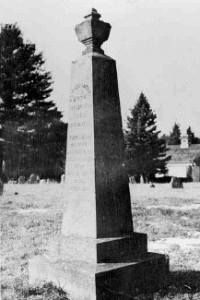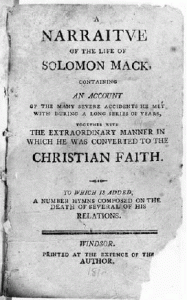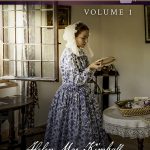
Ancestry of Joseph Smith
Joseph Smith was born in Sharon, Windsor County, Vermont, December 23, 1805. He was the third son and fourth child of Joseph and Lucy Mack Smith, who had a family of ten children. His parents were of sturdy New England stock, honest, godfearing, industrious, but poor in worldly substance. Joseph Smith had descended on his paternal side from Robert Smith, who emigrated from England in the year 1638. Robert Smith was born August 6, 1626, in Sutterton, Lincolnshire, England. His father was also named Robert Smith, born in 1589 in Sutterton, Lincolnshire, England. His mother, Margaret, was born about 1593 in Frampton, Lincolnshire, England. He had two brothers, Edward and the other also by the name of Robert, and one sister, Margaret. In his early youth he went to Boston, Lincolnshire, and then to London, where he took ship for America. He landed in Boston, Massachusetts, and moved to that part of Rowley, in Essex County, which afterwards became the township of Boxford. Here, later, he purchased two hundred eight acres of land, a portion of which was in Topsfield township. He married Miss Mary French. They were the parents of ten children. Robert was known among his neighbors as a quiet, unassuming man, devoted to the welfare of the settlement. Through his industry he was able to provide some comforts for his family, who were reared in the prevailing religious teachings of that day, but strictly in the knowledge of the scriptures.1
Patriotic Service of Samuel Smith

Samuel, son of Robert and Mary, was born January 26, 1666. He married Rebecca, daughter of John Curtis, a prominent citizen of the town of Topsfield. After his father’s death, Samuel moved to Topsfield, where he became an influential member of that community and was honored by the citizens with several offices of trust. He was the father of nine children. His son Samuel, born January 26, 1714, was one of the most prominent citizens of Topsfield. The greater part of his life was spent in the service of the people. He passed through the stormy days of the American Revolution and bore arms in defense of the liberties of the people. Among the many positions he held are the following;—He was grand juryman, road supervisor, on the committee of safety, assessor and selectman in Topsfield, moderator, representative to the General Court (House of Representatives), town clerk, delegate to the Provincial Congress at Concord, on the tea committee, and acted as chairman.
He was known as Captain Samuel Smith, receiving his military title during service in the militia of Massachusetts. He married Priscilla, daughter of Zacheus Gould of Topsfield. They had five children, two sons and three daughters. The mother died shortly after the birth of her youngest child, and Samuel married a cousin of his first wife who bore the same name. He died November 14, 1785, leaving an estate valued at more than 544 pounds sterling. The Salem Gazette of November 22, 1785, made mention of him in the following words:
“Died.—At Topsfield, on Monday, the 14th instant, Samuel Smith, Esq. So amiable and worthy a character as he evidently appeared, both in public and private, will render the memory of him ever precious. For a number of years he represented the town in the General Court, where he was esteemed a man of integrity and uprightness. His usefulness among those with whom he was more immediately conversant was eminent. He was a sincere friend to the liberties of his country, and a strenuous advocate for the doctrine of Christianity.”
“The memory of the Just be blessed.” 2
Asael Smith, Grandfather of Joseph Smith
Asael Smith was the second son and youngest child of (2) Samuel. He was born in Topsfield, March 7, 1744. His mother died, as already noted, shortly after his birth. His early life was spent in Topsfield. February 12, 1767, he took to wife, Mary Duty, of Windham, New Hampshire, and later moved to that place. From there he went to Dunbarton and then to Derryfield, now the city of Manchester. During the Revolution he followed the example of his illustrious father and served with the Colonial forces. After the death of his father in 1785, he returned to Topsfield and made his home on the family estate. He lived in the old home, about one mile north of the town, where a number of his children were born, notably Joseph, father of the Prophet Joseph Smith.

Asael was a man of very liberal views, far in advance of his time. Some of his children were members of the Congregational Church, but in his religious views he leaned toward the teachings of the Universalists. However, he held aloof from all sects, because he could not reconcile his understanding of the scriptures with their many conflicting creeds. He advocated the truth very strongly, that all men should have free and equal religious liberty. In his opinions he was frank and explicit, expressing himself without fear of the prevailing opinions of his neighbors. He was somewhat gifted with the pen and wrote some worthy sentiments which have been preserved and are still in possession of members of the family. Many years before his death he wrote a charge to his family in which the advice given could be followed with great profit by parents and children even in our day. An excerpt from this document will give an insight into the character of this man and depict his remarkable faith in Jesus Christ:3
Advice of Asael Smith to His Family
“And first to you, my dear wife,” he wrote, “I do with all the strength and power that is in me, thank you for your kindness and faithfulness to me, beseeching God who is the husband of the widow, to take care of you and not to leave you nor forsake you, or suffer you to leave nor forsake him, nor his ways. Put your whole trust solely in him, he never did nor never will forsake any that trust in him. * * * And now my dear children, let me pour out my heart to you and speak first of immortality in your souls. Trifle not in this point; the soul is immortal; you have to deal with an infinite Majesty; you go upon life and death, therefore in this point be serious. Do all to God in a serious manner; when you think of him, speak of him, pray to him, or in any way make your addresses to his great majesty, be in good earnest. Trifle not with his name or with his attributes, nor call him to witness to any thing but is absolute truth, nor then, but when sound reason or serious consideration requires it. And as to religion, I would not wish to point out any particular way for you; but first I would wish you to search the scriptures and consult sound reason and see if they (which I take to be two witnesses that stand by the God of the whole earth) are not sufficient to evince to you that religion is a necessary theme * * *.
“For the public.—Bless God that you live in a land of liberty and bear yourselves dutifully and conscionably towards the authority under which you live. See God’s providence in the appointment of the Federal Constitution and hold union and order precious jewels.”4
Prediction of Asael Smith
In the spring of 1791 he moved from Topsfield to Tunbridge, Vermont, where he made his home for several years. As old age came on and his health impaired, he removed to Stockholm, St. Lawrence County, New York, and made his home with his son Silas. Here he died, October 31, 1830, at the advanced age of more than 86 years. In stature he was tall, his body was well proportioned and possessed of unusual strength. At times the spirit of inspiration rested upon him. On one occasion he said: “It has been borne in upon my soul that one of my descendants will promulgate a work to revolutionize the world of religious faith.” Perhaps he did not expect to live to see that day, but such proved to be the case. The first summer after the organization of the Church, his son Joseph and grandson, Don Carlos Smith, paid him a visit and presented him with a copy of the Book of Mormon. At the time he was in feeble health, but he diligently read the book, or most of it, and said he was convinced that the work of his grandson, Joseph Smith, was of divine origin. He was not baptized, due to his weakened physical condition, and died shortly after this visit. His wife, Mary Duty Smith, later moved to Kirtland, where she died in 1836, firm in the faith of the restored gospel.5
John Mack of Connecticut
On his maternal side, Joseph Smith was descended from John Mack, who was born in Inverness, Scotland, March 6, 1653. John Mack came to America about 1669, and resided, first in Salisbury, Massachusetts. He married Sarah, daughter of Orlando and Sarah Bagley, and moved to Lyme, Connecticut, where eight or more of their twelve children were born. He was the founder of the Mack family of Connecticut. He died Feb. 24, 1721.
Ebenezer, son of John Mack, was born in Lyme, Conn., Dec. 8, 1697. He was a man of thrift and was well respected by the people of Lyme, where he served for many years as minister of the Second Congregational Church. He married Hannah, daughter of Aaron Huntly, an honored citizen of Lyme. At one time, Ebenezer Mack possessed considerable property and “lived in good style, commanding all the attention and respect which are ever shown to those who live in fine circumstances and habits of strict morality.” fn Reverses came, however, and he was reduced, in his declining years, to poverty. He was the father of nine children.6
Maternal Grandparents of Joseph Smith
Solomon, son of Ebenezer Mack, was born in Lyme, Conn., Sept. 26, 1735. At the age of twenty-one years he enlisted in the services of his country under the command of Captain Henry, and the regiment of Col. Whiting. He was engaged in the king’s service with two teams carrying supplies to Fort Edwards. In 1748 he enlisted under Major Spenser and was engaged in several bloody engagements in which his life was spared miraculously. He served until the spring of 1759, when he received his honorable discharge at Crown Point. That same year he met a young schoolteacher, Lydia Gates, daughter of Nathan Gates, a wealthy citizen of East Haddam, Connecticut. The friendship of these young people ripened and they were married after a short acquaintance. In 1761 Solomon and his young wife moved to Marlow where they took up their residence in a wilderness. Only four other families resided within forty miles of them. It was while here he learned to fully appreciate the excellent virtues of his wife, “For,” he writes, “as our children were deprived of schools she assumed charge of their education, and performed the duties of instructress as none, save a mother, is capable of. Precepts, accompanied with examples such as theirs, were calculated to make impressions on the minds of the young, never to be forgotten. She, besides instructing them in the various branches of an ordinary education, was in the habit of calling them together both morning and evening, and teaching them to pray, meanwhile urging them the necessity of love towards each other as well as devotional feelings towards Him who made them.”

In this manner their children became confirmed in the virtues and were established in faith in their Redeemer.7
Patriotic Service of Solomon Mack
In 1776, Solomon Mack enlisted in the American army. For some time he served in the land forces and later was transferred to the navy. With his two sons, Jason and Stephen, he was engaged in a privateering expedition commanded by Captain Havens. In this service they passed through some thrilling experiences, but escaped without great harm. His service in the war covered a period of about four years. After his discharge he went to Gilsum, New Hampshire, to make his home. Owing to the rigorous campaigns through two wars, he became broken in health and suffered considerably in his declining years. His son Stephen moved to Vermont and later to Detroit, where he engaged in mercantile pursuits and was one of the founders of Detroit. During the war of 1812 Stephen again entered the service of his country. He held the commission of a captain at the time of the siege of Detroit and was ordered by his superior officer to surrender, which he boldly refused to do. Breaking his sword across his knee he threw the parts into the lake and said he would not submit to such a disgraceful compromise while the blood of an American ran in his veins.
Such is the character of the forbears of Joseph Smith.8







